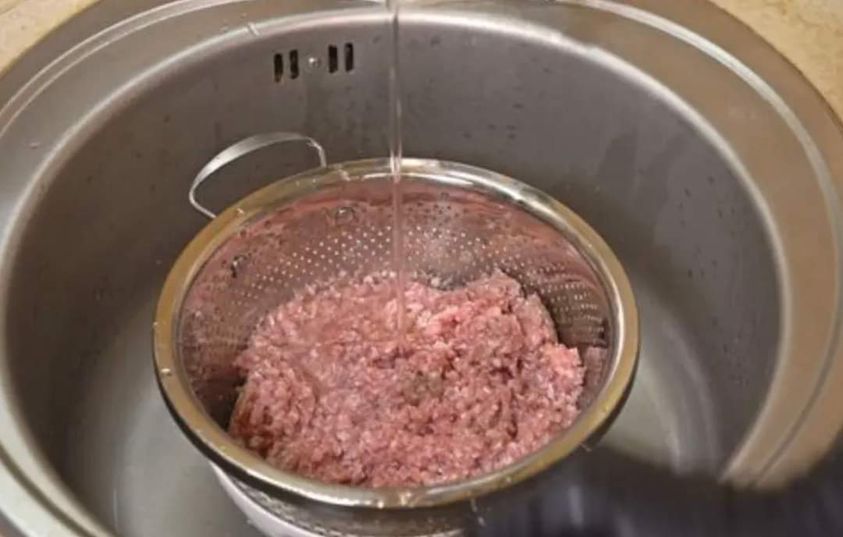Should You Rinse Ground Beef? The Ultimate Guide
Ground beef is a kitchen staple, but there’s a heated debate among home cooks: should you rinse it before or after cooking? Some say it reduces fat, while others believe it destroys flavor. Let’s dive into both sides of this culinary question and discover what really works best for your taste and health.

The Case for Rinsing Ground Beef
Health-Conscious Cooking
Rinsing ground beef is a common practice for those who prioritize reducing fat intake. By washing the beef after browning, some believe it cuts down on excess grease, making the meal healthier without sacrificing too much flavor.
Cutting Down on Grease
If you’ve ever cooked ground beef, you know it releases a lot of fat, especially if it’s not a lean variety. Some cooks swear by rinsing it off to create a leaner dish, ideal for low-fat recipes or those trying to lighten their meals.
Why Some Say No to Rinsing Ground Beef
Flavor Loss and Texture Changes
Many chefs argue that rinsing ground beef washes away more than just fat—it takes the flavor with it. Fat plays a significant role in making meat juicy and flavorful. When you rinse it, you risk making the beef dry and bland.
Fat Equals Flavor
Fat in ground beef carries flavors and moisture that are crucial for that juicy, mouthwatering bite. Removing the fat through rinsing can leave your meat tough and less enjoyable, especially in dishes like burgers, tacos, or meatloaf.
The Mess Factor of Rinsing Ground Beef
Splashing Grease and Water Everywhere
Rinsing ground beef can create an unexpected mess in your kitchen. When hot grease meets cold water, it splashes, and that can leave your sink area greasy and in need of a thorough cleaning. Plus, it’s not just about cleanliness—there’s a bigger issue lurking.
The Plumbing Nightmare
Pouring hot grease down the drain is a common mistake. As it cools, the fat hardens, which can clog your pipes, leading to costly plumbing repairs. A safer alternative is to drain the grease into a container, let it solidify, and toss it in the trash.
Is There a Better Way? Alternatives to Rinsing
Draining Ground Beef Without Rinsing
Instead of rinsing, consider simply draining the ground beef after cooking. Tilt the pan and spoon out the excess grease, or use a colander to let it drain naturally. This method preserves the flavor while reducing fat content.
Blotting with Paper Towels
If you’re still concerned about fat but don’t want to rinse, you can blot the ground beef with a paper towel after draining it. This removes any lingering grease without losing the flavor and texture that make ground beef delicious.
Should You Rinse Ground Beef to Reduce Fat?
Choosing Leaner Cuts
If your goal is to reduce fat, one simple solution is to opt for leaner cuts of ground beef. Ground beef is available in different fat-to-lean ratios, such as 80/20, 90/10, or even 93/7. By selecting a leaner variety, you’ll naturally have less fat to deal with during cooking.
The Impact of Rinsing on Ground Beef Recipes
For Full-Flavor Recipes
For dishes that rely on the richness of the beef, like burgers, meatballs, or lasagna, you might want to skip the rinse. These recipes need the fat to maintain their juicy, savory appeal. Rinsing could leave you with a dry, lackluster result.
For Health-Focused Meals
On the other hand, if you’re cooking a dish where you want to minimize fat for health reasons, such as in a stir-fry or taco salad, rinsing may help you achieve a lighter meal. Just remember, the texture might not be as tender.
Should You Rinse Ground Beef for Health Benefits?
A Healthy Compromise
For those aiming for a healthier dish, rinsing might seem like a quick fix. However, it’s not the only option. Simply cooking ground beef with the right techniques—such as draining and blotting—can still reduce fat without losing the essence of the dish.
Leaner Cuts and Portion Control
Another way to reduce fat is to control portion sizes and choose leaner cuts from the start. This avoids the need to rinse and helps you maintain a healthier diet while keeping flavor intact.
How to Get the Best of Both Worlds
Retaining Flavor While Reducing Fat
If you’re torn between reducing fat and keeping flavor, one solution is to drain the grease but skip the rinse. This way, you still get rid of excess fat, but the meat retains its natural juiciness and flavor.
Cooking Techniques for Juicier Beef
The key to juicy ground beef is proper cooking techniques. Avoid overcooking, as this dries out the meat, and use moderate heat to retain moisture. By cooking it just right, you can enjoy the richness without excess fat.
What to Avoid When Rinsing Ground Beef
Don’t Rinse Raw Meat
Never rinse raw ground beef. While some may think it helps remove bacteria, it actually increases the risk of spreading harmful bacteria like E. coli around your kitchen via splashes.
Avoid Using Hot Water
If you do decide to rinse cooked ground beef, avoid using hot water. Hot water can cause grease to splash and create a bigger mess in the kitchen, leading to more cleanup and potential plumbing issues.
So, Should You Rinse Ground Beef?
It Depends on Your Goals
In the end, the decision to rinse or not rinse ground beef comes down to personal preference. If cutting fat is your main concern, rinsing might work for you. But if you’re all about retaining flavor and texture, it’s best to skip the rinse and opt for draining instead.
There’s No Right or Wrong Answer
Whether you rinse or not, there’s no wrong approach—just what works best for your cooking style. Experiment and find out what method gives you the results you’re looking for. After all, cooking is all about creating dishes that you enjoy.
Rinsing Ground Beef—Yes or No?
The debate on rinsing ground beef doesn’t have a one-size-fits-all answer. It’s about finding the right balance between health and taste that works for you. Whether you’re looking to reduce fat or enhance flavor, understanding both sides of the debate will help you make the best decision for your kitchen. Happy cooking!





